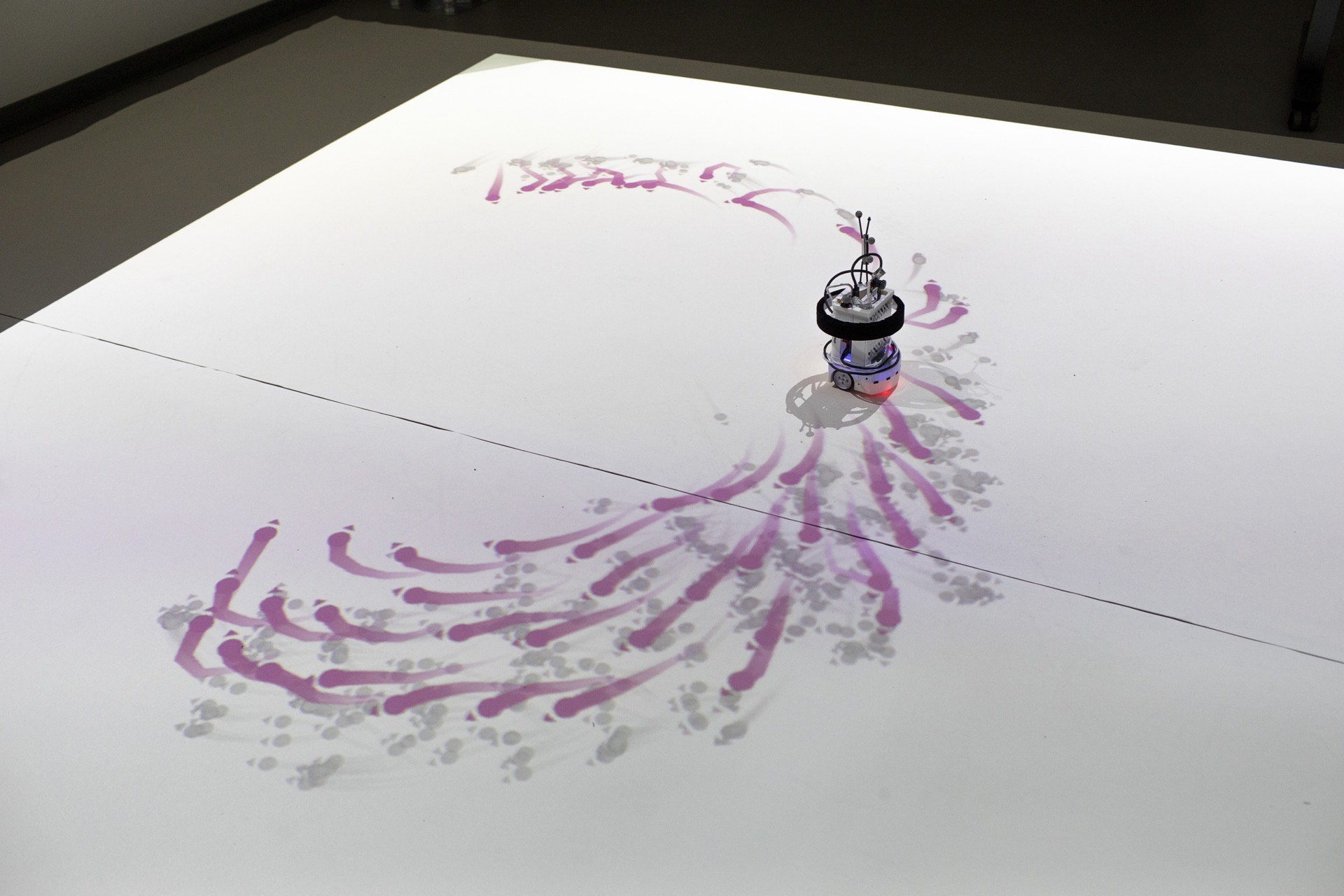
©SCIoI
A fundamental challenge in cooperative problem solving in human, animal or robotic groups is the integration of personal and social information. Relying too heavily on the former prevents the spread of information among group members, whereas relying too heavily on the latter may hamper profitable personal exploration and reduce collective performance. P34 investigates this key process by studying how collectives of different complexities dynamically balance personal and social information use across different levels of environmental complexity to find and extract spatially distributed resources (collective foraging) from their environment and by that to achieve collective intelligence.
The first aim of the proposed work was to develop a fully vision-based mechanistic modeling framework that allows us to investigate how cooperative agents integrate personal and social cues. We moved beyond previous work by considering how collective intelligence in spatial search can arise mechanistically from the individual-level cognitive integration of personal information and different local social cues provided purely by the available sensory input of the individuals (Preprint available: https://www.biorxiv.org/content/10.1101/2023.11.30.569379v2).
Secondly we investigated the performance of our framework across different environments and parametrizations i.e. across different individual strategies of information weighing in agents. According to the properties of the resource environment different strategies yield optimal results on the individual and on the collective level during collective spatial foraging. With our framework we investigated the performance of a wide range of strategies in different environments for virtual agents.
Furthermore, we proposed to investigate both human collective problem solving in matching experimental scenarios. Human groups are an ideal system to study cooperative problem solving, since human cooperation exceeds all other species in scale and range.
As the last module of our project, we plan to, according to what we have learned from simulations and experiments with human participants, synthesize collective foraging behavior on a group of Thymio robots. The engineered swarm will search for resource items in a simulated light-projection environment. Resource units will be created as light blobs that robots can find and “collect” together. To provide such a dynamic projected resource landscape for robots we will use techniques from augmented reality through our custom-made projection setup CoBe (Collective Behavior). By synthesizing natural behavior in real environments we can learn how physical constraints, unavoidable in the real world, further influence collective behavior.
Project Results
Project 34 studied how collectives of different complexities (agents, robots and humans) weight personal and social information across different settings. The team used a bottom-up approach targeting the cognitive process of the agents, to understand how individual-level cognition shapes collective performance. These different collectives were faced with the task to find resources in collectives. In humans, they used immersive reality environments and found that humans alter key parts of their cognition to the resource environment in an adaptive manner (link). Studying a similar process in ABMs, the team found similar results in artificial collectives (link). Here, they could explore in much more detail the role of real-world constraints, showing how real-world constraints (such as visual occlusion) can safeguard against maladaptive herding.
Related Publications +
2756394
proj034
1
apa
50
creator
desc
year
20207
https://www.scienceofintelligence.de/wp-content/plugins/zotpress/
%7B%22status%22%3A%22success%22%2C%22updateneeded%22%3Afalse%2C%22instance%22%3Afalse%2C%22meta%22%3A%7B%22request_last%22%3A0%2C%22request_next%22%3A0%2C%22used_cache%22%3Atrue%7D%2C%22data%22%3A%5B%7B%22key%22%3A%22JK9QACNJ%22%2C%22library%22%3A%7B%22id%22%3A2756394%7D%2C%22meta%22%3A%7B%22creatorSummary%22%3A%22Wu%20et%20al.%22%2C%22parsedDate%22%3A%222024%22%2C%22numChildren%22%3A0%7D%2C%22bib%22%3A%22%26lt%3Bdiv%20class%3D%26quot%3Bcsl-bib-body%26quot%3B%20style%3D%26quot%3Bline-height%3A%202%3B%20padding-left%3A%201em%3B%20text-indent%3A-1em%3B%26quot%3B%26gt%3B%5Cn%20%20%26lt%3Bdiv%20class%3D%26quot%3Bcsl-entry%26quot%3B%26gt%3BWu%2C%20C.%2C%20Deffner%2C%20D.%2C%20Kahl%2C%20B.%2C%20Meder%2C%20B.%2C%20Ho%2C%20M.%2C%20%26amp%3B%20Kurvers%2C%20R.%20%282024%29.%20Adaptive%20mechanisms%20of%20social%20and%20asocial%20learning%20in%20immersive%20collective%20foraging.%20%26lt%3Bi%26gt%3BNature%20Communications%26lt%3B%5C%2Fi%26gt%3B%2C%203539.%20%26lt%3Ba%20class%3D%26%23039%3Bzp-DOIURL%26%23039%3B%20href%3D%26%23039%3Bhttps%3A%5C%2F%5C%2Fdoi.org%5C%2F10.1038%5C%2Fs41467-025-58365-6%26%23039%3B%26gt%3Bhttps%3A%5C%2F%5C%2Fdoi.org%5C%2F10.1038%5C%2Fs41467-025-58365-6%26lt%3B%5C%2Fa%26gt%3B%26lt%3B%5C%2Fdiv%26gt%3B%5Cn%26lt%3B%5C%2Fdiv%26gt%3B%22%2C%22data%22%3A%7B%22itemType%22%3A%22journalArticle%22%2C%22title%22%3A%22Adaptive%20mechanisms%20of%20social%20and%20asocial%20learning%20in%20immersive%20collective%20foraging%22%2C%22creators%22%3A%5B%7B%22creatorType%22%3A%22author%22%2C%22firstName%22%3A%22Charley%22%2C%22lastName%22%3A%22Wu%22%7D%2C%7B%22creatorType%22%3A%22author%22%2C%22firstName%22%3A%22Dominik%22%2C%22lastName%22%3A%22Deffner%22%7D%2C%7B%22creatorType%22%3A%22author%22%2C%22firstName%22%3A%22Benjamin%22%2C%22lastName%22%3A%22Kahl%22%7D%2C%7B%22creatorType%22%3A%22author%22%2C%22firstName%22%3A%22Bj%5Cu00f6rn%22%2C%22lastName%22%3A%22Meder%22%7D%2C%7B%22creatorType%22%3A%22author%22%2C%22firstName%22%3A%22Mark%22%2C%22lastName%22%3A%22Ho%22%7D%2C%7B%22creatorType%22%3A%22author%22%2C%22firstName%22%3A%22Ralf%22%2C%22lastName%22%3A%22Kurvers%22%7D%5D%2C%22abstractNote%22%3A%22%22%2C%22date%22%3A%222024%22%2C%22section%22%3A%22%22%2C%22partNumber%22%3A%22%22%2C%22partTitle%22%3A%22%22%2C%22DOI%22%3A%2210.1038%5C%2Fs41467-025-58365-6%22%2C%22citationKey%22%3A%22%22%2C%22url%22%3A%22https%3A%5C%2F%5C%2Fwww.nature.com%5C%2Farticles%5C%2Fs41467-025-58365-6%22%2C%22PMID%22%3A%22%22%2C%22PMCID%22%3A%22%22%2C%22ISSN%22%3A%22%22%2C%22language%22%3A%22%22%2C%22collections%22%3A%5B%5D%2C%22dateModified%22%3A%222025-09-26T13%3A16%3A18Z%22%7D%7D%2C%7B%22key%22%3A%22K7EBUVCK%22%2C%22library%22%3A%7B%22id%22%3A2756394%7D%2C%22meta%22%3A%7B%22creatorSummary%22%3A%22Mezey%20et%20al.%22%2C%22parsedDate%22%3A%222024%22%2C%22numChildren%22%3A0%7D%2C%22bib%22%3A%22%26lt%3Bdiv%20class%3D%26quot%3Bcsl-bib-body%26quot%3B%20style%3D%26quot%3Bline-height%3A%202%3B%20padding-left%3A%201em%3B%20text-indent%3A-1em%3B%26quot%3B%26gt%3B%5Cn%20%20%26lt%3Bdiv%20class%3D%26quot%3Bcsl-entry%26quot%3B%26gt%3BMezey%2C%20D.%2C%20Bastien%2C%20R.%2C%20McKee%2C%20N.%2C%20Zheng%2C%20Y.%2C%20Stoll%2C%20D.%2C%20Hamann%2C%20H.%2C%20%26amp%3B%20Romanczuk%2C%20P.%20%282024%29.%20Purely%20vision-based%20collective%20movement%20of%20robots.%20%26lt%3Bi%26gt%3BNpj%20Robotics%26lt%3B%5C%2Fi%26gt%3B%2C%20%26lt%3Bi%26gt%3B3%26lt%3B%5C%2Fi%26gt%3B%2C%2011.%20%26lt%3Ba%20class%3D%26%23039%3Bzp-DOIURL%26%23039%3B%20href%3D%26%23039%3Bhttps%3A%5C%2F%5C%2Fdoi.org%5C%2F10.1038%5C%2Fs44182-025-00027-2%26%23039%3B%26gt%3Bhttps%3A%5C%2F%5C%2Fdoi.org%5C%2F10.1038%5C%2Fs44182-025-00027-2%26lt%3B%5C%2Fa%26gt%3B%26lt%3B%5C%2Fdiv%26gt%3B%5Cn%26lt%3B%5C%2Fdiv%26gt%3B%22%2C%22data%22%3A%7B%22itemType%22%3A%22journalArticle%22%2C%22title%22%3A%22Purely%20vision-based%20collective%20movement%20of%20robots%22%2C%22creators%22%3A%5B%7B%22creatorType%22%3A%22author%22%2C%22firstName%22%3A%22David%22%2C%22lastName%22%3A%22Mezey%22%7D%2C%7B%22creatorType%22%3A%22author%22%2C%22firstName%22%3A%22Renaud%22%2C%22lastName%22%3A%22Bastien%22%7D%2C%7B%22creatorType%22%3A%22author%22%2C%22firstName%22%3A%22Neal%22%2C%22lastName%22%3A%22McKee%22%7D%2C%7B%22creatorType%22%3A%22author%22%2C%22firstName%22%3A%22Yating%22%2C%22lastName%22%3A%22Zheng%22%7D%2C%7B%22creatorType%22%3A%22author%22%2C%22firstName%22%3A%22David%22%2C%22lastName%22%3A%22Stoll%22%7D%2C%7B%22creatorType%22%3A%22author%22%2C%22firstName%22%3A%22Heiko%22%2C%22lastName%22%3A%22Hamann%22%7D%2C%7B%22creatorType%22%3A%22author%22%2C%22firstName%22%3A%22Pawel%22%2C%22lastName%22%3A%22Romanczuk%22%7D%5D%2C%22abstractNote%22%3A%22%22%2C%22date%22%3A%222024%22%2C%22section%22%3A%22%22%2C%22partNumber%22%3A%22%22%2C%22partTitle%22%3A%22%22%2C%22DOI%22%3A%2210.1038%5C%2Fs44182-025-00027-2%22%2C%22citationKey%22%3A%22%22%2C%22url%22%3A%22%22%2C%22PMID%22%3A%22%22%2C%22PMCID%22%3A%22%22%2C%22ISSN%22%3A%22%22%2C%22language%22%3A%22%22%2C%22collections%22%3A%5B%5D%2C%22dateModified%22%3A%222025-09-26T13%3A16%3A18Z%22%7D%7D%2C%7B%22key%22%3A%22LFSG6PSM%22%2C%22library%22%3A%7B%22id%22%3A2756394%7D%2C%22meta%22%3A%7B%22creatorSummary%22%3A%22Mezey%20et%20al.%22%2C%22parsedDate%22%3A%222024%22%2C%22numChildren%22%3A1%7D%2C%22bib%22%3A%22%26lt%3Bdiv%20class%3D%26quot%3Bcsl-bib-body%26quot%3B%20style%3D%26quot%3Bline-height%3A%202%3B%20padding-left%3A%201em%3B%20text-indent%3A-1em%3B%26quot%3B%26gt%3B%5Cn%20%20%26lt%3Bdiv%20class%3D%26quot%3Bcsl-entry%26quot%3B%26gt%3BMezey%2C%20D.%2C%20Deffner%2C%20D.%2C%20Kurvers%2C%20R.%20H.%2C%20%26amp%3B%20Romanczuk%2C%20P.%20%282024%29.%20Visual%20social%20information%20use%20in%20collective%20foraging.%20%26lt%3Bi%26gt%3BPLoS%20Computational%20Biology%26lt%3B%5C%2Fi%26gt%3B%2C%20%26lt%3Bi%26gt%3B20%26lt%3B%5C%2Fi%26gt%3B%2C%201%26%23x2013%3B24.%20%26lt%3Ba%20class%3D%26%23039%3Bzp-ItemURL%26%23039%3B%20href%3D%26%23039%3Bhttps%3A%5C%2F%5C%2Fdoi.org%5C%2F10.1371%5C%2Fjournal.pcbi.1012087%26%23039%3B%26gt%3Bhttps%3A%5C%2F%5C%2Fdoi.org%5C%2F10.1371%5C%2Fjournal.pcbi.1012087%26lt%3B%5C%2Fa%26gt%3B%26lt%3B%5C%2Fdiv%26gt%3B%5Cn%26lt%3B%5C%2Fdiv%26gt%3B%22%2C%22data%22%3A%7B%22itemType%22%3A%22journalArticle%22%2C%22title%22%3A%22Visual%20social%20information%20use%20in%20collective%20foraging%22%2C%22creators%22%3A%5B%7B%22creatorType%22%3A%22author%22%2C%22firstName%22%3A%22David%22%2C%22lastName%22%3A%22Mezey%22%7D%2C%7B%22creatorType%22%3A%22author%22%2C%22firstName%22%3A%22Dominik%22%2C%22lastName%22%3A%22Deffner%22%7D%2C%7B%22creatorType%22%3A%22author%22%2C%22firstName%22%3A%22Ralf%20HJM%22%2C%22lastName%22%3A%22Kurvers%22%7D%2C%7B%22creatorType%22%3A%22author%22%2C%22firstName%22%3A%22Pawel%22%2C%22lastName%22%3A%22Romanczuk%22%7D%5D%2C%22abstractNote%22%3A%22%22%2C%22date%22%3A%222024%22%2C%22section%22%3A%22%22%2C%22partNumber%22%3A%22%22%2C%22partTitle%22%3A%22%22%2C%22DOI%22%3A%2210.1371%5C%2Fjournal.pcbi.1012087%22%2C%22citationKey%22%3A%22%22%2C%22url%22%3A%22https%3A%5C%2F%5C%2Fdoi.org%5C%2F10.1371%5C%2Fjournal.pcbi.1012087%22%2C%22PMID%22%3A%22%22%2C%22PMCID%22%3A%22%22%2C%22ISSN%22%3A%22%22%2C%22language%22%3A%22%22%2C%22collections%22%3A%5B%5D%2C%22dateModified%22%3A%222025-09-26T13%3A16%3A16Z%22%7D%7D%2C%7B%22key%22%3A%22UG5ZUB6N%22%2C%22library%22%3A%7B%22id%22%3A2756394%7D%2C%22meta%22%3A%7B%22creatorSummary%22%3A%22Deffner%20et%20al.%22%2C%22parsedDate%22%3A%222024%22%2C%22numChildren%22%3A1%7D%2C%22bib%22%3A%22%26lt%3Bdiv%20class%3D%26quot%3Bcsl-bib-body%26quot%3B%20style%3D%26quot%3Bline-height%3A%202%3B%20padding-left%3A%201em%3B%20text-indent%3A-1em%3B%26quot%3B%26gt%3B%5Cn%20%20%26lt%3Bdiv%20class%3D%26quot%3Bcsl-entry%26quot%3B%26gt%3BDeffner%2C%20D.%2C%20Mezey%2C%20D.%2C%20Kahl%2C%20B.%2C%20Schakowski%2C%20A.%2C%20Romanczuk%2C%20P.%2C%20Wu%2C%20C.%20M.%2C%20%26amp%3B%20Kurvers%2C%20R.%20%282024%29.%20Collective%20incentives%20reduce%20over-exploitation%20of%20social%20information%20in%20unconstrained%20human%20groups.%20%26lt%3Bi%26gt%3BNature%20Communications%26lt%3B%5C%2Fi%26gt%3B.%20%26lt%3Ba%20class%3D%26%23039%3Bzp-DOIURL%26%23039%3B%20href%3D%26%23039%3Bhttps%3A%5C%2F%5C%2Fdoi.org%5C%2F10.1038%5C%2Fs41467-024-47010-3%26%23039%3B%26gt%3Bhttps%3A%5C%2F%5C%2Fdoi.org%5C%2F10.1038%5C%2Fs41467-024-47010-3%26lt%3B%5C%2Fa%26gt%3B%26lt%3B%5C%2Fdiv%26gt%3B%5Cn%26lt%3B%5C%2Fdiv%26gt%3B%22%2C%22data%22%3A%7B%22itemType%22%3A%22journalArticle%22%2C%22title%22%3A%22Collective%20incentives%20reduce%20over-exploitation%20of%20social%20information%20in%20unconstrained%20human%20groups%22%2C%22creators%22%3A%5B%7B%22creatorType%22%3A%22author%22%2C%22firstName%22%3A%22Dominik%22%2C%22lastName%22%3A%22Deffner%22%7D%2C%7B%22creatorType%22%3A%22author%22%2C%22firstName%22%3A%22David%22%2C%22lastName%22%3A%22Mezey%22%7D%2C%7B%22creatorType%22%3A%22author%22%2C%22firstName%22%3A%22Benjamin%22%2C%22lastName%22%3A%22Kahl%22%7D%2C%7B%22creatorType%22%3A%22author%22%2C%22firstName%22%3A%22Alexander%22%2C%22lastName%22%3A%22Schakowski%22%7D%2C%7B%22creatorType%22%3A%22author%22%2C%22firstName%22%3A%22Pawel%22%2C%22lastName%22%3A%22Romanczuk%22%7D%2C%7B%22creatorType%22%3A%22author%22%2C%22firstName%22%3A%22Charley%20M.%22%2C%22lastName%22%3A%22Wu%22%7D%2C%7B%22creatorType%22%3A%22author%22%2C%22firstName%22%3A%22Ralf%22%2C%22lastName%22%3A%22Kurvers%22%7D%5D%2C%22abstractNote%22%3A%22%22%2C%22date%22%3A%222024%22%2C%22section%22%3A%22%22%2C%22partNumber%22%3A%22%22%2C%22partTitle%22%3A%22%22%2C%22DOI%22%3A%2210.1038%5C%2Fs41467-024-47010-3%22%2C%22citationKey%22%3A%22%22%2C%22url%22%3A%22%22%2C%22PMID%22%3A%22%22%2C%22PMCID%22%3A%22%22%2C%22ISSN%22%3A%22%22%2C%22language%22%3A%22%22%2C%22collections%22%3A%5B%5D%2C%22dateModified%22%3A%222025-09-26T13%3A16%3A13Z%22%7D%7D%5D%7D
Wu, C., Deffner, D., Kahl, B., Meder, B., Ho, M., & Kurvers, R. (2024). Adaptive mechanisms of social and asocial learning in immersive collective foraging.
Nature Communications, 3539.
https://doi.org/10.1038/s41467-025-58365-6
Mezey, D., Bastien, R., McKee, N., Zheng, Y., Stoll, D., Hamann, H., & Romanczuk, P. (2024). Purely vision-based collective movement of robots.
Npj Robotics,
3, 11.
https://doi.org/10.1038/s44182-025-00027-2
Mezey, D., Deffner, D., Kurvers, R. H., & Romanczuk, P. (2024). Visual social information use in collective foraging.
PLoS Computational Biology,
20, 1–24.
https://doi.org/10.1371/journal.pcbi.1012087
Deffner, D., Mezey, D., Kahl, B., Schakowski, A., Romanczuk, P., Wu, C. M., & Kurvers, R. (2024). Collective incentives reduce over-exploitation of social information in unconstrained human groups.
Nature Communications.
https://doi.org/10.1038/s41467-024-47010-3





